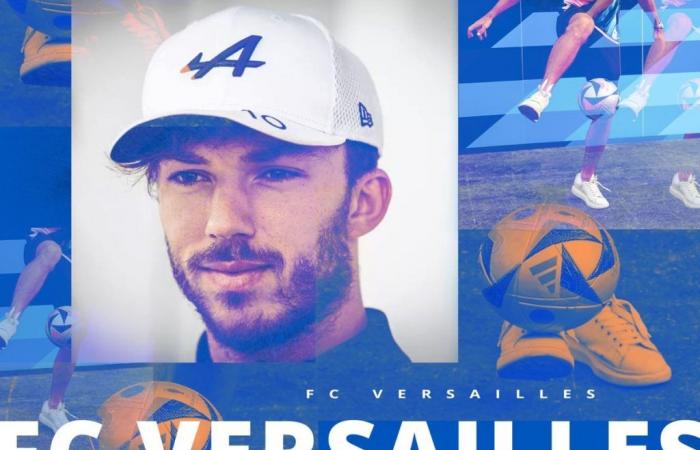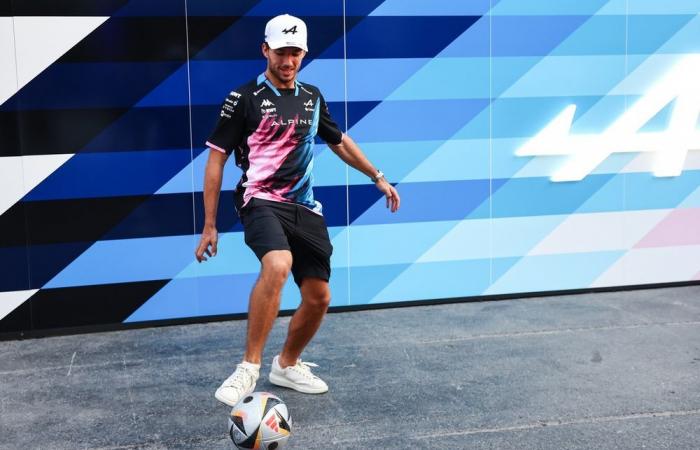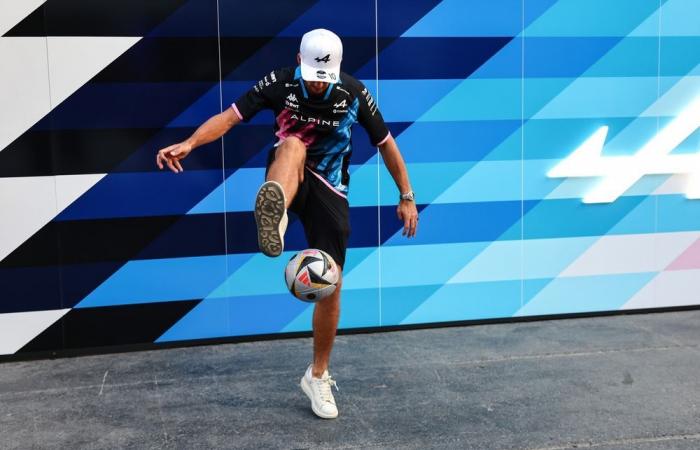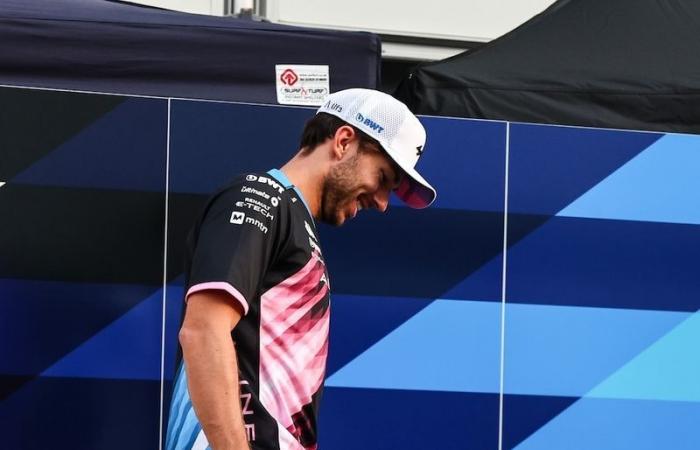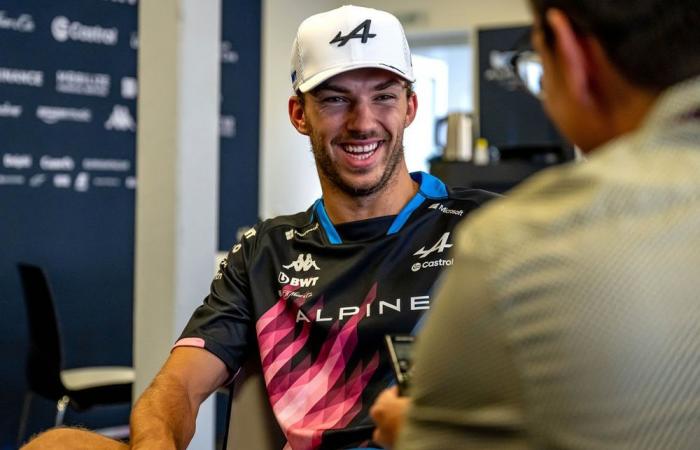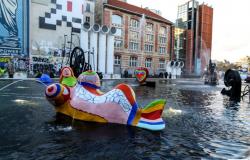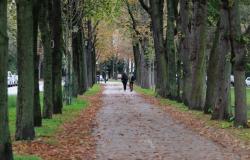In a parallel universe, Pierre Gasly is a professional footballer who often wonders how far he could have gone in motor racing if he had continued his career in karting. In our world, however, the French F1 driver occasionally wonders if he could have played for his favorite club, Paris Saint-Germain, if he had chosen a different path during his teenage years.
If you follow Pierre Gasly on Instagram, you know that the 28-year-old from Rouen is a big football fan. His F1 number, 10, is a tribute to legendary footballer Zinedine Zidane, who wore it for much of his international career. Gasly regularly walks the paddock wearing football jerseys, notably those of PSG and the French team. He organizes matches with members of Alpine to blow off steam after a long day at the circuit (they will play in a 30,000-seat stadium in Mexico, the Alpine press officer told me). Last March, Gasly became co-owner of FC Versailles, a semi-professional club in National, the French third division.
Gasly started playing football at the age of 5. “I loved it”he told me with a big smile. “Honestly, I still dream about it. The sport itself, playing ball and being with my teammates. And the whole atmosphere of being with your team, going to different locations and challenging other teams from other cities I loved every moment.”
“Just this morning, I was saying to myself: ‘I think that the day I retire from F1, I will join a senior team, just to play’. Because it’s really a great, great passion for Me.”
Before Alpine’s PR guy seized the opportunity and took Gasly to another interview, we talked about investing in a team, having to choose between his two loves as a teenager and of his life outside Formula 1.
You once told me that you had a “good level” when you played football as a child. What do you mean by “good level”?
Well, I’ve clearly lost my touch! [les tentatives de Gasly pour montrer ses talents de footballeur peu avant l’interview n’ont pas vraiment atteint un “bon niveau”, ndlr]. But back then I was good with the ball. We played in the Coupe de France and we had a good qualifying run for a small club.
One day, we went to training in Auxerre, which was the French champion at the time. They had a very famous manager, Guy Roux, who I was able to meet. And I was selected for training.
I ran a lot. I was a winger. Until I was 11, I played half court, and as a winger, I switched from offense to defense, from offense to defense. It was actually very good for me, because I developed very, very good cardio. I put as much effort into karting as I did into football.
At the age of 6 you also started karting. How did you manage football, karting and school?
When I was 6 or 7 years old – I don’t remember exactly – the school suggested to my parents that I skip a year, because I had very good grades and they thought I could get a year in advance. And I think my parents were smart enough to say: “We prefer that he follows [son année scolaire normale] and that he does well at school, because that will give him more time to play sports”. I could devote the rest of my time to karting and football. And I did quite well.
When I started karting competitions at 9 years old, it started to get complicated with football. When I was 10 or 11, I started missing a few practices from time to time. And because of the races, I couldn’t attend all the matches. I remember coming to a game on Sunday and the coach wasn’t happy that I was focusing more on karting than football. He told me that to punish me, he would put me in the second team. I replied: “Damn, I don’t want to play on the B team”. And I stopped that day.


The decision must have been difficult to make.
I said to myself: “Okay, I have to choose.”. But in my mind it was already clear. Even though they are my two biggest passions, my love for karting and racing was a little bigger. And then, I think I was a little more competitive in karting than in football – the former brought me more trophies. I got to a point where I realized I couldn’t do both to the fullest. And that didn’t suit me.
Are there things you learned in football that you take advantage of in motorsport? You mentioned cardio…
Cardio is clearly one of them. But also team spirit and mutual support. In football, sometimes you have to go the extra mile to make up for a teammate’s mistake. It also happens that we make a mistake and need someone to help us. Then, in the locker room, even when you’re kids, you start to bond and you understand that your best matches are actually the ones where there’s good synergy between everyone.
On a larger scale, in F1, it’s the same thing. When we’re in the engineering room, it’s like a football locker room. The only difference is that everyone is dressed. But in Formula 1 too, everyone has to be together and very united as a team, there has to be a lot of transparency and honesty, and everyone has to work to achieve the same goal. So I think it was very helpful to get that team mentality from a young age.
Karting is more individualistic. At the time, it was just my dad and me. So we don’t really worry about having a team behind you. But on Wednesdays, I would go to a game or a practice and I would be with other kids, and I had to understand that I had to fit in and have that team spirit.
And then, sport in general brings structure to life. For example, practice is at six…you have to be there at six. You have to do all the exercises, follow the process and train to progress and become stronger. When we’re kids, we don’t necessarily see it at the time, but sport brings a certain structure to our work, which is essential for everything we do later.
I need something other than Formula 1 in my life to mentally balance me and feel good.
At the start of the year, you decided to invest in FC Versailles. How did you get there?
As a huge football fan, I have always wanted to be involved in the sport. Obviously, I wasn’t going to participate in it as a player. But I always had in the back of my mind that if one day an interesting offer came along, I would find a way to get involved.
The owner who took over FC Versailles last year contacted me at the end of the year because he saw that I was very interested in football, that I went to the matches a lot and watched lots of football. They explained to me their project, their vision of the club, what they wanted to do and how. They then asked me if I wanted to join them in this project.
It is obvious that football is a very complex sport. But given my knowledge of my sport and my experience working in a high performance environment, they were very keen to understand the standards of F1 and the way things work here, and in a way to use some of this knowledge and introduce some of these standards within the club.
As an athlete, I think that’s also an area where I bring a lot to them. I try to put myself in the player’s place. I can say: “As an athlete, me personally, I need this and that taken care of”. Generally speaking, landlords aren’t that interested in this sort of thing.
They consider sport more as a commercial activity, which sometimes prevents them from taking the player aspect into account. But when you know how to get the most out of your players, it translates into performance on the field. The discussions are therefore very interesting. And it’s another look at football, which I didn’t have before, but which I really appreciate.
I think that in terms of values, we are very close. I have established very good relationships with the other two owners [Alexandre Mulliez et Fabien Lazare]. And then I said to myself: “OK, it’s really a very attractive project”. And in the long term too. I need something other than F1 in my life to mentally balance me and feel good. And it’s something I like to follow, in addition to Formula 1.
Obviously, I am not involved on a day-to-day basis, but every week we meet to take stock. And if they play, I watch the game. I am very proud to be part of the adventure.
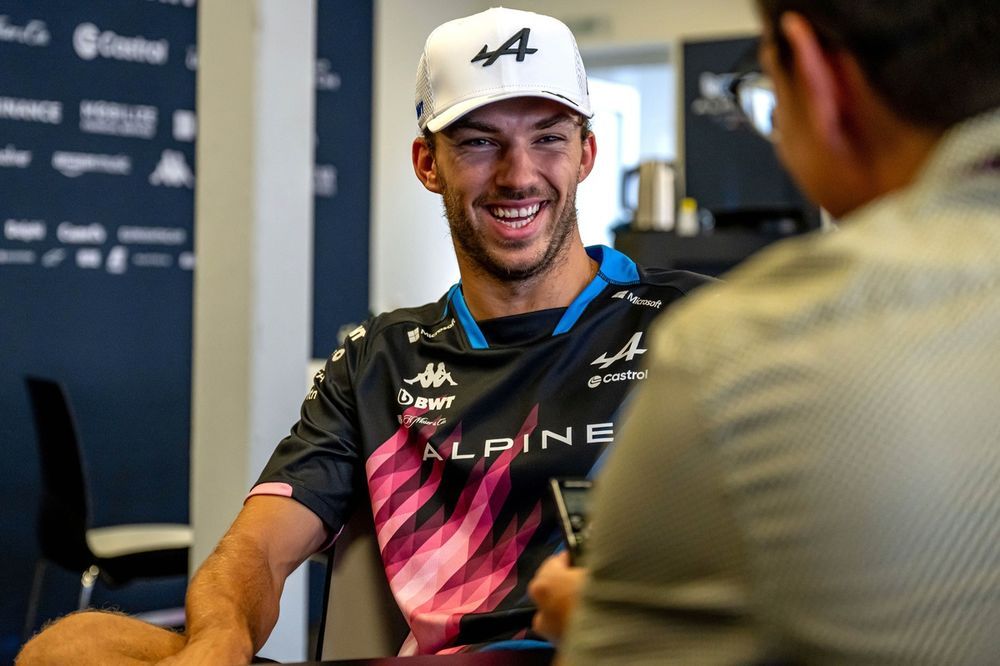
Photo de: Michael Potts / Motorsport Images
What are your ambitions for FC Versailles? Can it be a success story like Wrexham AFC, which rose from England’s fifth division to League One, the third division?
We are in the third division. The short-term objective is to reach the second division, which is obviously very difficult because the competition is very tough. Football is so important, there are many clubs with big budgets and big structures. So it’s a great challenge, but we’re not going to hide it. For us, it is clear that we want to reach the second division. And in the medium and long term, reaching the first division, which represents a big leap forward that we will be able to make, I hope, in a few years.
About Wrexham: Actors Ryan Reynolds and Rob McElhenney, who bought the club in 2020, joined the Alpine F1 team as investors last year. Did you ask them for advice before investing in FC Versailles?
No, but I was definitely inspired by the story of Ryan and Wrexham. As a football fan, I obviously followed his journey with Wrexham. It’s a bit the same thing for me. [Le football] is not my field of activity. And I’m getting started with other people who don’t come from the world of football either. And yes, I would like there to be a friendly match between Wrexham and Versailles one day!
Have you also considered making a series of documentaries on FC Versailles, such as “Welcome to Wrexham”?
It’s in the pipeline, because yes, you need exposure, you need sponsors. The more money we have, the more good infrastructure we have, the more efficient the players are. So we need to promote our team in the best possible way. But to be honest, there’s a great team looking after it and doing a really good job. We hope that the results will live up to the ambitions.
This interview has been condensed and edited for clarity.

